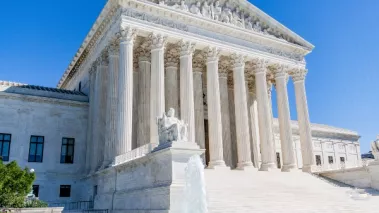Table of Contents
Supreme Court grants cert in speech code case, Uzuegbunam v. Preczewski

The Supreme Court of the United States today agreed to hear the campus free speech case of Uzuegbunam v. Preczewski. The resulting opinion will clarify important questions about how students can vindicate their First Amendment rights when public colleges violate them. In March, FIRE filed an amicus curiae brief with the Supreme Court urging the Court to grant certiorari.
“[T]he Eleventh Circuit’s decision fails to appreciate that the deprivation of a constitutional right is an injustice irrespective of whether it results in monetary loss.”
The case stems from a 2016 incident in which Georgia Gwinnett College student Chike Uzuegbunam was prevented from talking to others about his Christian faith in the school’s common areas. Despite being a public institution bound by the First Amendment, Georgia Gwinnett’s policy at the time banned any expression “which disturbs the peace and/or comfort of person(s)” and restricted speech to two tiny “free speech zones.” Uzuegbunam was told he would need to reserve such a space to exercise his free speech rights.
Represented by the Alliance Defending Freedom, Uzuegbunam sued Georgia Gwinnett. But after the school agreed to change the policies — in what appeared to be a move to stop litigation — the federal district court dismissed the case for mootness. The U.S. Court of Appeals for the Eleventh Circuit upheld the district court’s ruling. FIRE filed an amicus brief before the Eleventh Circuit panel, as well as one requesting rehearing by the entire Eleventh Circuit, which was denied.
At issue is whether a claim for nominal damages — that is, a small, symbolic amount of money — can survive when an offending policy has been changed or the student has graduated, or both. Because colleges can change their policies at any time and students often graduate before a case reaches a final resolution, nominal damages are an important tool for ensuring students have their day in court.
In FIRE’s brief to the Supreme Court, we argued that students will be prevented from vindicating their First Amendment rights if schools are allowed to avoid litigation by simply changing their policies after using those very same policies to violate student rights. Instead, we urged the Court to clarify that students who had their rights violated by public colleges and universities should not be prevented from pursuing justice through the legal system, writing:
If standalone nominal damages claims are mooted . . . students will be left with little incentive to challenge unlawful speech codes in court. Student speech rights will become increasingly devalued and colleges and universities will be emboldened to expand their speech restrictions.
“[T]he Eleventh Circuit’s decision fails to appreciate that the deprivation of a constitutional right is an injustice irrespective of whether it results in monetary loss,” we wrote. “This Court’s intervention is needed to protect students’ ability to hold colleges and universities accountable and to vindicate their priceless First Amendment rights.”
FIRE Legal Network member Kevin King of Covington & Burling and his colleague Justin Burnam assisted FIRE in filing the brief.
We hope today’s development at the Supreme Court signals that soon, public institutions will no longer be able to use this legal loophole to violate students’ rights with impunity.
Recent Articles
Get the latest free speech news and analysis from FIRE.

VICTORY: Court vindicates professor investigated for parodying university’s ‘land acknowledgment’ on syllabus

Can the government ban controversial public holiday displays?

DOJ plan to target ‘domestic terrorists’ risks chilling speech
